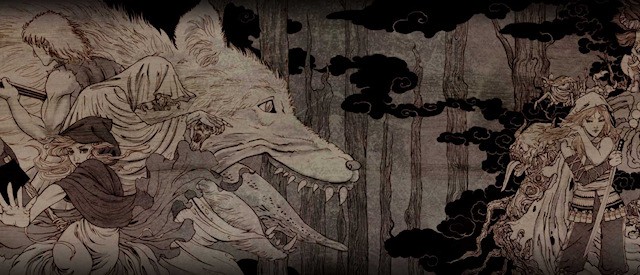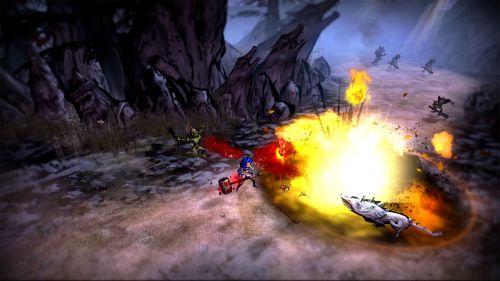

American McGee has been part of the videogame industry since the 1990s when he worked at id Software on such titles as DOOM II, QUAKE, and QUAKE 2. After leaving id he went on to release a handful of games for EA including Alice. Afterwards he formed his own studio, Spicy Horse, releasing the episodic game Grimm. Now American and Spicy Horse are looking to make a splash in the Action RPG market with a game called Akaneiro: Demon Hunters.
Akaneiro is a game that is based on Japanese mythology, drawing its art style and design from 19th century Japanese art. It mixes this with a story inspired by Little Red Riding hood, making for something that sounds incredibly unique.
While the game is all but complete, the American wants something more for the game. So he's turned to Kickstarter in the hopes of adding 4 major things: Co-Op, Portable versions, crafting, and support. We chatted with the legendary designer about a few of these things.

Co-Optimus: Obviously the art style of Akaneiro is the big draw, with the Japanese watercolor inspired visuals, but what is the game's biggest gameplay element that will attract players?
American McGee: We've been listening to player feedback since late 2012 and hearing pretty consistent noises about what's liked, loved and in need of tuning. By far, the biggest attractions, as told to us by our players, are the streamlined elements of core game play, open training across classes, unified currency (Karma) linking together all aspects of the game, the open nature of the economy and that it's really exciting without being too grindy. In most respects, what we hear is it "doesn't feel forced."
Though it's not necessarily a "gameplay element," we also working really hard as a development studio to build and maintain really high quality customer support and community services. That means we've got people online 24/7 in our chats and forums, interacting with players, taking feedback and helping to make the overall game experience better. It's great to be able to interact directly with our players without having a big publisher standing in the way!
Co-Optimus: Two of the biggest ARPGs launched last year on the PC with Torchlight 2 and Diablo 3. What inspiration, if any, do you take from these games and the genre?
American McGee: Both games provided a lot of inspiration for the team – and now that Akaneiro is in the market, we're hearing a lot of favorable comparisons being drawn to both D3 and T2. Design and production was mainly driven by Spicy Horse's Creative Director, Ben Kerslake and his design partner, Matt Razzano. They both dove deep into the genre, examining ARPG's new and old. Their goal was to present a streamlined experience tailored to web and mobile play – while still being able to offer appeal for more hardcore fans of the genre.
Co-Optimus: Why choose this particular genre of game to make? What about it was appealing to you?
American McGee: Since 2011, our studio has been fortunate in being able to choose what types of games to work on without having to ask a publisher for permission. Our decisions are driven primarily by a desire to build games that we ourselves would enjoy playing. ARPG's have a long and successful history in Asia, so the team jumped on the idea without hesitation – even though creating a game in this genre is typically considered "hard" when compared to other genres. That fearlessness is an indication of their passion for and knowledge of the genre.
It's appealing because there's plenty of room to explore everything from narrative to art and design. Everyone in the studio's had a chance to contribute in a meaningful way to the project. It's also a genre that invites a high level of player interaction with the team – we've seen this when comparing it to the other online titles we're making. Whenever RPG elements are introduced, the curiosity and desire for mastery really increases.
Co-Optimus: Is Akaneiro a service based product? That is, will you need to be connected online to some server infrastructure to make things work? Or can it be played offline?
American McGee: As is the case with the majority of games developed in Asia, Akaneiro is online-only. One reason for going this route is that we've leveraged our technology across platforms and devices, giving players a choice of ways in which to play – be it in a web browser, via downloadable stand-alone client or on mobile tablets (iOS and Android). With our back-end tech, you can take your profile with you across platform and devices – and once we've added co-op multiplayer, you'll be able to play with your friends online in real-time regardless of where or how they're connecting.
Co-Optimus: You hint at a consistent stream of content for the game. With an agressive update cycle, quality can suffer. What kind of content can we expect as the game grows? How can we ensure it'll be more than just a few weapons and a new map?
American McGee: If there's one thing this studio has proven over the past 6 years of development it's that we can crank out exceptionally high-quality art consistently and quickly. That's owing to the fact that we have some of the best (and fastest!) artists in the region – and that this same team has been working together since the company was first started (look at what we did with the Grimm or Alice: Madness Returns projects). Beyond that, it's a simple matter of early planning around the idea of high value content updates – the pipeline was put in place, from the start, to ensure we could out-deliver other games in this respect.
You should expect to see new areas (maps) released every 45 days or so. Those will often include updates to monsters, weapons and other in-game items. From time to time we'll also do larger update packages containing entire new "islands," so that you're able to leave Yomi Island (where the game begins) and travel to new lands filled with ever more horrific beasties. The depth and frequency of content updates are linked directly to customer demand – the more people play the game and support it, the faster and richer the content you'll see flowing into it.
Co-Optimus: You made the decision to leave co-op out initially from Akaneiro. What sort of variables led to this decision?
American McGee: It's a simple matter of technical resource availability and managing our overall launch schedule. If we'd continued to work towards a final release which contained co-op, then we'd be looking at a mid-2013 launch. By launching a single-player only version first, we're able to use early feedback to improve the game overall while freeing our tech guys to focus solely on development of the best possible co-op experience. For us, being small can often be an advantage – driving us to employ innovative methods a larger team might overlook because they can simply throw more money/resources at a problem. It also means we sometimes have to stagger our development or releases as we're doing with the co-op aspect of Akaneiro.
Co-Optimus: If co-op wasn't initially included in the design, how can it be incorporated in and still feel meaningful?
American McGee: It's been in the design from the start, and a functional "stub" for it can be found in the game at launch this week. Check out the "Summon Ally" feature – using it, you'll engage with an A.I. controlled co-op player can be brought into battle. What remains now is connecting control and other bits to allow that Ally to be another live-player. It's not a giant leap – but it is one we planned from the start, both in terms of initial design and the manner in which we're developing it post-launch.
As with any core feature in the game, it's also important to keep in mind that these things can and do evolve over time in response to feedback we get from players. That's one of the great things about developing online games – that we can constantly update and improve them in all aspects. Co-op will be no different.
Co-Optimus: If co-op IS included, what kind of support will we see? Local or Online? How many players do you expect to support?
American McGee: Co-op will be included, and since our Kickstarter appears to be on track for funding, I think we can hope for a "more quickly" version of getting it in there. In any case, no aspect of the game will be presented as "local." Co-op will always be online and will support between 2 and 4 players inside a party initially. Depending on demand we'll look to evolve and expand on that – it really just depends on what players are asking for. Our other online games support 8v8 matches in real-time, so the tech is there. It's more a question of world design and playability. Our sense is that tighter parties against more focused enemies will be more fun, but we'll look to player feedback after launch to see if that's really the case.
Co-Optimus: What sort of appeal is there to including co-op? Will players be able to perform certain special moves they weren't before, or is there some other draw? Better loot? Tougher/special enemies?
American McGee: It's certainly geared towards tougher enemies and areas, which will often result in better loot and overall mission rewards. After the initial functionality is added, we'll also look at delivering a series of co-op only missions built around the idea of raiding parties. Really it's just more fun to play together! Though we don't have fully functional co-op in the game just yet, we do have other social features and live chat – so we're seeing a social fabric evolve in and around the game as we speak.
Co-Optimus: If the game ends up on Android/iOS devices, will co-op be supported on those devices as well? Would players be able to use their characters on those devices (import from PC/Mac)?
American McGee: Yep! This is a really big deal for us, and it's something we think gamers should expect to start seeing more often. Our goal is to make it possible for you to play our games wherever you are – on mobile/tablets, via a web browser or using the client-download. And we'll make it possible for you to play across various platforms – be it Kongregate, Steam or our own gaming portal, SpicyWorld – with your friends on other platforms and devices, seamlessly. We've put a lot of effort into this technology with the hopes players will enjoy game access anywhere on anything!
Akaneiro: Demon Hunters is currently on Kickstarter with the campaign ending on February 2nd. As of the time of publishing they've received $155,000 of their goal of $200,000. It seems regardless of the outcome, co-op will be added to the game. It's just that if the Kickstarter succeeds we'll see it implemented more quickly. There's a lot of potential here - a cross platform co-op ARPG in a unique setting with consistent content updates. We'll definitely be keeping an eye on this one.
Thanks to American McGee for taking the time to chat with us about Akaneiro.